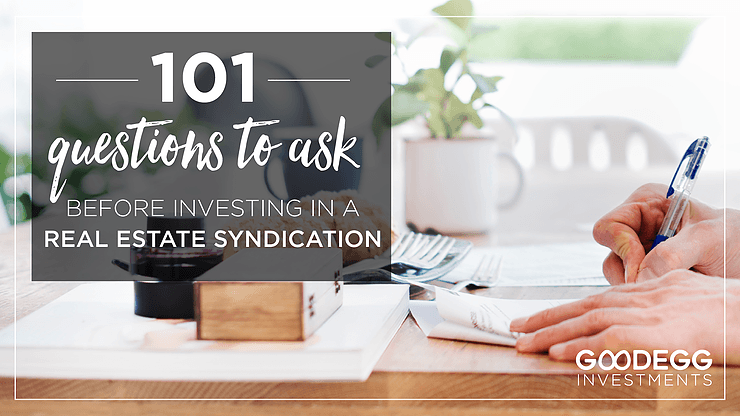Investing in real estate is a very smart way to diversify your investment portfolio while also securing the potential to generate great cash flow. Whether you are a seasoned commercial real estate investor or it’s your first time exploring real estate investment opportunities, potential deals can be found almost anywhere.
So, how do you know which real estate investment is right for you?
This article will discuss various types of real estate properties, the difference between active and passive real estate investments, how to get started in real estate investing, and how to evaluate a commercial real estate investing deal. Plus, you’ll walk away armed with 101 questions that should be asked and answered before making any money moves.
Real Estate Investing Basics
You don’t have to have in-depth knowledge about real estate to become a successful real estate investor, but if you have never invested in real estate before, you need to understand the basics before diving into the deep end. Just like with any investment, you must perform your own due diligence before investing your hard-earned money.
First, let’s talk about the different types of properties and investment vehicles available to real estate investors and the differences between an active or passive investing strategy.
Types of Real Estate Properties
When entering into real estate investing, you will consider two basic property types, residential or commercial.
Residential properties include single-family homes, duplexes, quadplexes, or any other housing used as primary residences, excluding large multi-family units, such as apartments.
Commercial real estate refers to any property focused on business activities intended to produce a profit. Examples of such are office buildings, retail centers, storage facilities, apartments, shopping centers, industrial properties, assembly plants, multifamily apartment complexes, or any other building that is rented out in exchange for cash flow.
Both residential rental property and commercial real estate properties can be outstanding income-producing properties in your investment portfolio, depending on your investment goals.
When deciding on an investment property, you need to understand the differences between these two types of real estate and the pros and cons of each. It would also be beneficial to know whath kind of rental income you can expect (passive or active), what operating expenses you might incur, property taxes, and the tax benefits you earn as a real estate investor in each type of property.
Active vs. Passive Real Estate Investments
Real estate is one of the strongest long-term investments you can make, and it can be one of the most lucrative passive sources of cash flow you can find. However, not all real estate investing is passive; therefore, what is the difference between an active and passive investment income?
An active real estate investment means you find the property, you use your own capital on the property, you find qualified tenants, you manage the property, and you are the one responsible for all maintenance and repairs. In short, YOU are responsible for everything pertaining to your rental property (or properties), and it may seem like overseeing these properties is a full-time job.
Residential properties are often the most active investments, and while it’s a great idea to hire a property manager to help you with most of the work of overseeing your rental properties, this will cut into your return on investment. Real estate investors who enjoy being a landlord and/or working on their investments almost daily should look into investing in residential real estate.
A passive real estate investment is one you do not need to be actively engaged in running or managing and instead, are only responsible for making an initial investment. Typically this is how commercial real estate is structured. There are parties in charge of managing the asset, paperwork, tenants, and property maintenance, and then there are passive investors who simply provide capital.
Most residential real estate investments are active investments, but there are real estate investments that are truly passive. If you are looking for a passive real estate investment, I suggest working with someone experienced in the commercial real estate syndication space.
How to Get Started in Commercial Real Estate Investing
Commercial real estate differs from residential real estate in two ways. First, the value is estimated by usable square footage. Second, commercial leases are usually longer than residential leases.
Residential real estate is heavily dependent on the “comparables” around it. These are nearby homes with similar specifications to help set the buying price and, then, in turn, the selling price of the property. In contrast, commercial real estate is valued based on the income (rent) collected from tenants.
Most of the financials surrounding commercial real estate focus on the ratio of operating expenses to rental income. You can get a feel for deals by asking about key numbers, including rental income, insurance, property management fees, taxes, and other fees associated with running an office building or industrial space.
Commercial real estate investments are generally accompanied by various fees that may lower the net operating income, so be diligent in determining the asset management costs associated with the offered deal.
If you decide to invest in commercial real estate through a syndication, then you are not the one purchasing, managing, or having to find tenants for the property, but you still need to understand how commercial real estate properties work to understand if this will be a sound investment.
To understand whether a real estate deal is a good investment for you, you should be prepared to ask questions about the market, the deal itself, and the team that will be structuring and guiding the investment.
Want To Invest With Us?
You're invited! Join the Goodegg Investor Club to get access to our open investments and to stay in the loop on upcoming opportunities.
join now
How to Evaluate a Real Estate Investment Deal
Understand the Real Estate Market
Let’s pretend you are looking for commercial real estate in a growth-oriented market with a history of appreciation, low property taxes, and a growing economy.
Because your syndication sponsors have done thorough research, they should be able to tell you why the syndicator has decided to invest in a particular commercial real estate property in a particular market (and present real numbers to support their choice).
You also should ask about other projects happening nearby and how those projects could affect the returns your syndicator/sponsor is pursuing.
Understand the deal
Syndication deals vary widely, and you should clarify as many details as possible before signing the paperwork. The most obvious questions should be answered upfront: how much capital must you invest, what’s the potential monthly cash flow, and how long will you need to keep your money in the deal?
You want to move beyond the outline of the deal and ask how the sponsors determined the timeline, how often payouts are distributed, and what the sponsors will do if the market softens near the end of the deal or if interest rates rise or flatten dramatically.
You can’t control the variables after you’ve signed, but the right questions will help you decide if you should accept the real estate deals being offered.
Know the Team
Generally, the management team’s credentials are the most overlooked when real estate investors agree to invest in a particular commercial deal. The personalities tend to get lost in the paperwork and research, but make no mistake – the team is the most important part of commercial real estate investing.
A strong, experienced group of professionals with high integrity who stand by their due diligence, work for your benefit, and know how to pivot in the face of a recession or market slump.
A team with high integrity but little experience may be unable to handle the shifting economy or other surprises. A team with low integrity, no matter their experience, can cause you long-term economic damage.
Find out the experience your sponsors have had in real estate and how they’ve dealt with adversity. Ensure they have the proper attorneys, brokers, CPAs, and a reputable investment manager with an understanding of commercial real estate.
Don’t be afraid to ask for references or even do a background check. Your personal finances are at stake, so be bold in researching the team working with your capital.
The bottom line – real estate is like any other business; the best teams usually create the best outcomes; therefore, you want to make sure you are investing with a management team who is seasoned and prepared for any changes to the market.
What to Ask a Real Estate Agent or Sponsor
When you invest in a real estate syndication, you’re putting your trust in the sponsor team and asset manager. These people will be responsible for the day-to-day operations of the commercial real estate investments, executing the business plan, and guarding your investment capital from loss.
Once you’ve signed the PPM (private placement memorandum) and wired your funds, you, as a passive investor investing in a real estate syndication, have very little control over the direction and performance of the asset, including what’s being done to generate cash flow. For this reason, it’s crucial to ask the sponsor your questions before moving forward.
Your upfront due diligence plays a crucial role, as its thoroughness will determine your experience in the syndication for the entire hold period. Your interactions with the sponsor team will influence your perspective about the information included in a private placement memorandum and how a syndication is run.
Take the time to ask your questions, do your research, and read between the lines. Squash all your doubts before investing in the deal, and only invest if you feel entirely confident that the sponsor team will help you generate passive income.
Questions All Real Estate Investors Should Ask Before Investing
To keep you on track, we’ve compiled a list of 101 questions all real estate investors should ask before investing with a new syndication sponsor. Of course, you might not want to ask every single question directly, but this list will give you an idea of what you should be thinking about and seeking answers.
Some answers, like the investment strategy and sponsor fees, can be found inside the investment summary or through independent research. For other solutions, you will need to ask the sponsor directly.
Check Out Our Open Investments
Want to invest alongside us? Take a look at some of our current and upcoming offerings.
see open deals
101 Questions To Ask When Investing In A Syndication
Why did you choose this real estate market?
How long have you been in this market?
What’s the biggest employer in the area?
What can you tell me about this submarket?
What other projects or developments are going on in this area?
Have you done other projects in this submarket?
When was this asset built?
What do you like about this asset class?
What don’t you like about this asset class?
How many units are there in this investment property?
What’s the unit mix?
What is the cost per unit, and how does that compare to the average for this area?
What’s the current occupancy?
What do you project the stabilized occupancy to be?
What’s the median income for current tenants?
What’s the business plan?
What are the projected premiums for renovated units?
How did you come up with the projected premiums?
How much money are you raising for this project?
How much of that is for the down payment?
How much of that is for cap ex (capital expenditures)?
What are the projected returns?
What is the overall equity multiple?
How is the real estate investment deal structured?
What are the equity splits?
Is there a preferred return? Why or why not?
How often do you pay out passive investor distributions – monthly, or quarterly?
What’s the projected hold time for this project?
How did you come up with that timeline?
What if the commercial real estate market is soft when the projected hold time ends?
How are investors kept up with the progress?
Are you taking an acquisition fee?
Are you taking an asset management fee?
Is there a refinance fee?
Is there a disposition fee?
What would happen if I had an emergency and needed access to my funds?
Who is the property management company?
How many deals have they managed like this?
Have you worked with these property managers before?
How did you find this property manager?
Why is the owner selling?
How did you find this deal?
How much experience do you have with this asset class?
What is the total loan amount?
What kind of loan are you getting?
Is the debt recourse or non-recourse?
What are the terms of the loan?
What is the LTV (loan-to-value) ratio?
What is the debt coverage ratio in year 1?
Did you walk the investment property?
Who is on the team?
What are their roles and responsibilities?
Have you done real estate investing deals together as a team before?
What happens to the real estate investment if you get hit by a bus?
Who is your securities attorney?
Is this offering open to non-accredited investors or accredited investors only?
Is this a 506(b) offering? 506(c)? Other?
What will I find when I run your background check?
Have you ever been a passive real estate investor?
What’s your ultimate goal with syndications?
How would you feel about giving me a few references?
Are you raising enough for cap ex?
What are the chances of a capital call (i.e., the sponsors requesting more money from the real estate investors)?
What’s the purchase cap rate?
What’s the projected reversion cap rate (i.e., exit cap rate)?
What did you do to stress test this real estate investment deal?
Have you visited, toured, and secret-shopped the comps in the area around the investment property?
May I visit the physical properties?
Do you need a loan guarantor? If so, who is your loan guarantor?
What’s the worst-case scenario if we lose money?
How do you do your due diligence?
How much deferred maintenance is there on this property?
Are you doing this full-time?
What did you do before this?
Why did you get into commercial real estate investing, specifically syndications?
Are you part of a syndication coaching or mentorship program?
Tell me about a time during a project when things didn’t go according to plan.
Do you need anyone for the earnest money deposit (EMD)?
What do we get for helping with EMD?
When does EMD go hard?
What happens if you have my EMD, it goes hard, and you can’t perform?
May I invest in these real estate deals with retirement funds?
What’s the minimum investment?
What’s the maximum investment?
Who’s your asset manager or property management team?
Who does your accounting?
When do you send out Schedule K-1s?
Will you be doing a cost segregation study?
What’s the plan if the economy changes or the market trends downward and you can’t sell?
Does your lender offer loan extensions? How much do the extensions cost?
Are you bringing your own money into the deal?
How do I send in my funds – wire, check, or other?
What is the deadline for getting my funds in?
Will you be offering an investor webinar for this particular real estate investment?
What percentage of the units will be renovated, and why?
Once the deal closes, what are the first three steps you will take to execute your real estate investment strategy?
Are you rebranding the investment property?
What would it be if you could wave a magic wand and change one thing about this property?
What are the most significant risks of investing in this commercial property syndication deal?
What do you like about the deal?
What DON’T you like about the deal?
Hopefully, some of these questions to ask have sparked new ideas or ways of thinking about potential commercial property syndication deals and deal sponsors.
When you’re looking at prospective investments, no question is off-limits. Do your due diligence and ask what you need to ask the syndication sponsor before you invest your own money.
You should feel comfortable and confident in the private real estate investment deal and the sponsor before ever signing the confidential private offering memorandum. If the deal sponsor brushes you off or doesn’t have clear answers, take that as an indication of how the relationship will be throughout the lifecycle of the syndication deal.
There will always be other real estate deals, so don’t rush into them. It’s likely that the equity multiple or projected cash flow initially attracted you to the deal, so before you jump in, take your time to properly vet the syndication opportunity and the deal sponsor properly.
Focus on the things that may not be so clearly written on paper, like relationships, personalities, and integrity, so you can feel fully confident throughout the commercial real estate syndication investing project.
P.S. If you’re looking to raise capital for your own real estate syndication deals, these questions, along with finding a good mentor, are a great place to start.
New To Passive Investing?
Sign up for our free Passive Real Estate Investing 101 course. You'll get 1 email a day for 7 days – everything you need to invest confidently in your first real estate syndication.
sign up now




